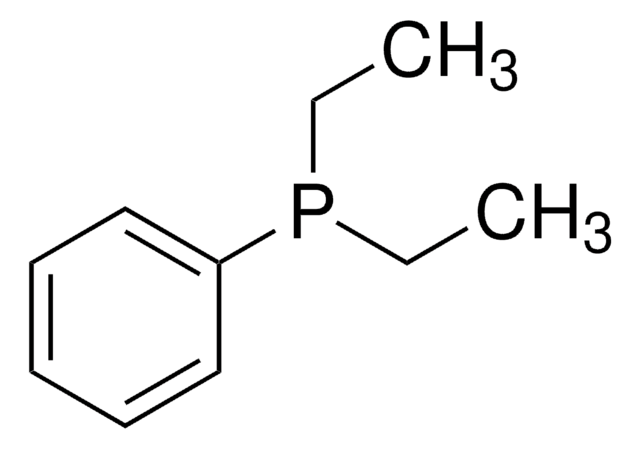265020
Dimethylphenylphosphine
99%
Synonyme(s) :
Me2PPh, Phenyldimethylphosphine
About This Item
Produits recommandés
Pression de vapeur
11 mmHg ( 68 °C)
Niveau de qualité
Pureté
99%
Forme
liquid
Capacité de réaction
reaction type: Buchwald-Hartwig Cross Coupling Reaction
reaction type: Heck Reaction
reaction type: Hiyama Coupling
reaction type: Negishi Coupling
reaction type: Sonogashira Coupling
reaction type: Stille Coupling
reaction type: Suzuki-Miyaura Coupling
Pertinence de la réaction
reagent type: ligand
Indice de réfraction
n20/D 1.563 (lit.)
Point d'ébullition
74-75 °C/12 mmHg (lit.)
Densité
0.971 g/mL at 25 °C (lit.)
Groupe fonctionnel
phosphine
Chaîne SMILES
CP(C)c1ccccc1
InChI
1S/C8H11P/c1-9(2)8-6-4-3-5-7-8/h3-7H,1-2H3
Clé InChI
HASCQPSFPAKVEK-UHFFFAOYSA-N
Vous recherchez des produits similaires ? Visite Guide de comparaison des produits
À utiliser avec
Mention d'avertissement
Warning
Mentions de danger
Conseils de prudence
Classification des risques
Eye Irrit. 2 - Flam. Liq. 3 - Skin Irrit. 2 - STOT SE 3
Organes cibles
Respiratory system
Code de la classe de stockage
3 - Flammable liquids
Classe de danger pour l'eau (WGK)
WGK 3
Point d'éclair (°F)
120.2 °F - closed cup
Point d'éclair (°C)
49 °C - closed cup
Équipement de protection individuelle
Eyeshields, Faceshields, Gloves, type ABEK (EN14387) respirator filter
Certificats d'analyse (COA)
Recherchez un Certificats d'analyse (COA) en saisissant le numéro de lot du produit. Les numéros de lot figurent sur l'étiquette du produit après les mots "Lot" ou "Batch".
Déjà en possession de ce produit ?
Retrouvez la documentation relative aux produits que vous avez récemment achetés dans la Bibliothèque de documents.
Les clients ont également consulté
Notre équipe de scientifiques dispose d'une expérience dans tous les secteurs de la recherche, notamment en sciences de la vie, science des matériaux, synthèse chimique, chromatographie, analyse et dans de nombreux autres domaines..
Contacter notre Service technique













